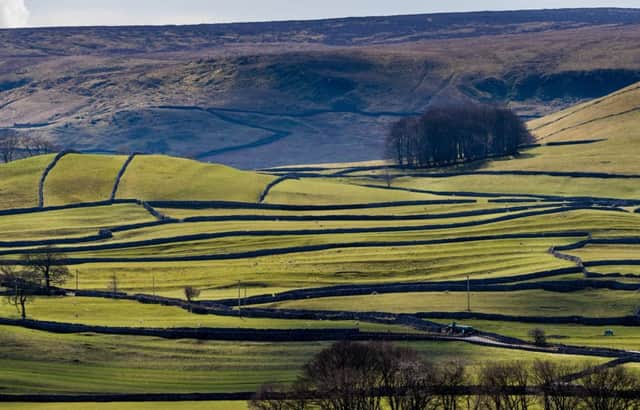'˜Hill farms at risk' if landowners paid to look after environment


Proposals by the Environment Secretary, Michael Gove, to replace the long-standing scheme of basic payments to farmers calculated according to acreage, with one that rewards environmental initiatives, could also have the effect of changing the signature landscape of the Yorkshire Dales, it was suggested.
The draft of Mr Gove’s long-awaited Agriculture Bill, published on Wednesday, proposes paying farmers and land managers for “public goods” such as higher environmental standards.
Advertisement
Hide AdAdvertisement
Hide AdBut a direct consequence could be a reduction in the number of animals left to graze on the county’s uplands, it is claimed.
The first warnings emerged on Thursday at a conference hosted by the Upper Nidderdale Landscape Partnership, at Pateley Bridge.
Chris Clark, a rural business advisor who farms near Buckden in upper Whardfedale, told delegates that under the plans, only farms with reduced stocks of animals would be financially viable.
He said the accounts from more than 50 such farms, some compiled for Mr Gove’s environment department by Askham Bryan College in York, had “turned conventional wisdom on its head” about the way upland farming was financed.
Advertisement
Hide AdAdvertisement
Hide Ad“It’s entirely counter-intuitive and we have been very surprised by the findings. But I’ve seen probably 25 hill farms now and the college has seen 35 more and they’re all exhibiting the same characteristics,” Mr Clark told The Yorkshire Post.
“The conclusion is that if there isn’t enough natural grass, there’s no amount of corrective economic action that can make the farming in the hills any more profitable.
“We have also found that for each farm there is a maximum sustainable stocking rate and beyond that, the profitability of that farm reverses.”
He added: “This completely blows out of the water the economies of scale business model that hill farmers have been encouraged to follow for the last 20, 30 or 40 years.”
Advertisement
Hide AdAdvertisement
Hide AdMr Clark said the result of Mr Gove’s proposals could be a wholesale move away from rearing animals on hill farms.
He acknowledged: There’s huge worry about uplands turning to scrub, and I understand that, but it is better for farmers to have a more viable business where they have less stock and where the cattle and the sheep pick out the bits that want grazing.”
The Government’s proposal is to phase out direct farm subsidies – which Ministers consider ineffective because they skew the system towards the largest landowners – over a seven-year period from 2021.
Joe Bonner, head of the rural business research unit at Askham Bryan College, said: “If subsidies reduce as they are forecast to do, the farming environment will have to change.
Advertisement
Hide AdAdvertisement
Hide Ad“In the future, more effort is going to be put into environmental resources and there will be fewer animals grazing on upland areas of the Dales.”
Paul Burgess, manager of the Nidderdale Area of Outstanding Natural Beauty, which oversees the lottery-funded Landscape Partnership, said: “Business as usual isn’t going to be an option, and the often-repeated solution of increasing stock numbers to try and increase productivity won’t necessarily make hill farms more profitable.
“In fact, the evidence is to the contrary. Simply increasing stocking numbers and increasing volumes will make farms less profitable and more vulnerable to change.”
Mr Gove said the Agriculture Bill would “allow us to reward farmers who protect our environment, leaving the countryside in a cleaner, greener and healthier state for future generations”.